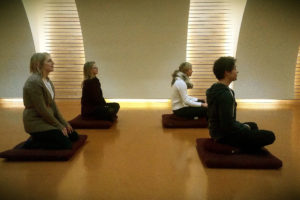“Our bodies are incredible parallel processers, picking up things that [our brains] can’t consciously notice right away,” Germano said. “If we are more attentive to how our bodies feel, we can pick up these signals.”
That kind of mental awareness and emotional literacy, Germano said, is essential not only for college students today, but for the working professionals they will become.
“These ideas and practices could help them throughout their academic career and as they manage issues in their private life, their social life and their careers,” he said. “Research is telling us these students’ careers won’t be like careers in the past; they’ll have to be adaptive, moving every three to four years. What frameworks and skills do they need for that, and how can we help them develop those through a series of deliberate practices?”
Srivastava said she uses several of the practices that she learned in her daily life, sometimes in quiet moments between classes or when she is trying to sleep. She’s encouraging her friends to do the same.
“I used some of these practices beforehand, but the class made me more aware of their benefits,” she said. “It also inspired me to bring up what I was learning in conversations with friends.”
Going forward, Germano and associate professor of education Karen Kurotsuchi Inkelas will work with faculty members at Wisconsin and Penn State to assess exactly how the Student Flourishing Initiative has helped students like Srivastava.
Though they are still finalizing their research plans, Germano said the study will include self-reports and various behavioral tasks – delivered through an app developed at the University of Wisconsin – as well as possibly physiological tests with a statistical sample of students.
“We are working to create this first-year academic experience for students across all three campuses and then make that experience the subject of a wide-ranging, randomized-control research program to understand the impact it might have on students’ academic performance, their resiliency and so forth,” he said.
The multi-university team also plans to develop an online portal with videos, suggested readings, interactive exercises and other resources for students and faculty members.
Already, Germano said, other universities, especially large public universities, are closely watching the class and related research.
“There is a lot of interest from other universities and colleges,” he said. “Right now, we are trying to use these three universities as incubators. Once we get to a stable point, we will share the results and resources with other schools.”
The interest among students, faculty and administrators at UVA and beyond, he said, all comes back to universities’ charge to foster students development not just as academics, but as thriving individuals, members of communities and professionals.
“Certainly, all of us who are parents want our children to flourish in the classroom, but there are other kinds of flourishing that we intensely aspire to as well,” Germano said. “We want our younger generations to have values we respect and to embody them; to be caring, resilient and able to cope with the vicissitudes of life… We want to give them the skills they will need to not just survive, but truly thrive and flourish in their lives.”
–Adapted from an original article by Caroline Newman, University of Virginia







